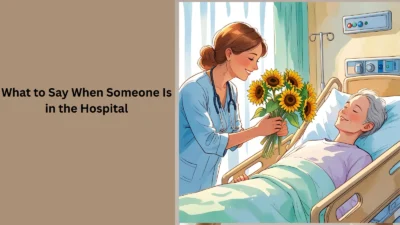What to Say to Someone Who Has Family in Hospice can feel like an overwhelming question. Finding the right words during such a sensitive time is crucial, as your support can offer immense comfort. It’s not always easy to know what to say, but showing compassion and presence goes a long way.
When someone you care about is facing the impending loss of a loved one, your empathy and understanding matter deeply. Whether it’s a simple message or a heartfelt conversation, your words can be a source of peace and strength.
In this guide, we’ll help you express kindness, offer support, and be there in a meaningful way.
Understand the Emotions Behind the Situation
When a family member is in hospice care, emotions are often running high. The person you’re speaking to may feel sadness, anxiety, or even anger. Acknowledge these emotions by expressing understanding and letting them know that it’s okay to feel what they’re feeling. You don’t need to have all the answers or provide solutions; just be present.
What to say:
“I’m so sorry you’re going through this. If you need to talk, I’m here for you.”
- “I can’t imagine what you’re feeling right now, but I’m here to listen whenever you need me.”
What not to say:
- “I’m sure everything will be okay.” While you may mean well, this can feel dismissive of the reality of the situation.
Offer Practical Support
At times like this, your loved one might be overwhelmed with the practical aspects of hospice care. Offering tangible help, such as cooking a meal or helping with errands, can relieve some stress and show you’re there for them.
What to say:
“I’m free to help with anything—whether it’s picking up groceries or just sitting with you for a bit.”
- “Is there anything specific I can do to make things easier for you right now?”
What not to say:
“Let me know if you need anything.” This phrase can be too vague. Instead, offer specific actions that show you care.
Acknowledge the Person’s Loved One in Hospice
While it can be uncomfortable, mentioning the person who is in hospice is important. It helps to acknowledge their situation and the gravity of what is happening. This can help your loved one feel heard and validated.
What to say:
“I know this must be so difficult, and I’m thinking of you and your [family member’s name].”
- “It’s okay to feel upset or unsure—there’s no right way to navigate this.”
What not to say:
- “At least they lived a long life.” While the person in hospice may have lived many years, this can come across as minimizing the emotional weight of the situation.
Respect Their Space, But Keep Reaching Out
It’s essential to respect the boundaries of someone going through such a challenging time. However, even if they seem to need space, continuing to check in is crucial. They may not always want to talk, but knowing you’re there can be a great comfort.
What to say:
- “I understand if you need some time alone, but I’m here whenever you want to talk or just need company.”
- “I’ll be thinking of you and your family, and I’m always a phone call away.”
- What not to say:
- “I’ll leave you alone for now.” Although this is meant to be considerate, it might leave your loved one feeling isolated.
Be a Listening Ear, Not a Problem Solver
Often, the person dealing with a loved one in hospice care just needs someone to listen. They may need to vent or share their feelings, and your role is to listen attentively without trying to fix the situation.
What to say:
- “I’m here to listen whenever you need to talk, even if you just need to share your thoughts.”
- “Take all the time you need, I’m here for you, no matter what.”
What not to say:
- “I know what you should do.” Offering unsolicited advice can seem dismissive and unhelpful.
Offer Hope, but Without Minimizing the Situation
While offering hope is important, it’s equally important not to dismiss the emotional weight of the moment. Phrases like “stay strong” can come across as insensitive, so it’s important to strike the right balance between optimism and empathy.
What to say:
- “I hope you find peace and comfort in the coming days, and I’m sending you all my love.”
- “I’m here to support you in whatever way you need during this time.”
What not to say:
- “You just have to be strong right now.” This can feel dismissive of the person’s vulnerability.
Final Thoughts
What to say to someone who has family in hospice is never easy, but with the right words, you can show deep empathy and care. Remember, your role is to offer support, listen, and provide comfort in whatever way feels most appropriate for your loved one.
It’s important to acknowledge their pain, offer practical help, and respect their emotional boundaries. While you can’t take away the grief, your presence and kindness can make a world of difference.




